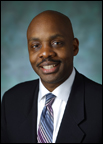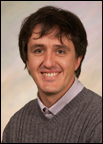| PROGRAMS and SERVICES |
||
|
||
| Prospective Fellows |
||
General Information |
||
| Contact |
||
| NIH Clinical Center Vascular Neurology Residency Program NIH, NINDS, Stroke Branch Phone: 301-435-9321 |
||
John Hallenbeck, MD
Entry Id: TP-50
Welcome Statement
Welcome to the Vascular Neurology Fellowship Program at the National Institutes of Health’s Clinical Center, America’s research hospital. Please explore the information below and contact us if you have any questions about the benefits of training here.
Program Overview
With a focus on clinical practice and research, the fellowship program at the National Institutes of Health is designed for neurologists who seek to become expert vascular neurologists. The NIH Vascular Neurology Fellowship Program is sponsored by the NIH Clinical Center and is supported by the Clinical Neurosciences Program (CNP) of the Intramural Division of the National Institute of Neurological Disorders and Stroke (NINDS). The program offers a one-year ACGME accredited vascular neurology fellowship. The opportunity exists to extend the Fellowship for a research-focused second (and possibly third) non-ACGME accredited year for those interested in an academic or research track.
The NIH Stroke Program's mission is to perform innovative translational research in acute stroke and to develop and evaluate novel treatments for stroke using biomarkers, particularly MRI and other neuroimaging modalities. The clinical and research activities of the NIH Stroke Program take place at the NIH Clinical Center (a 240-bed hospital dedicated to translational research and clinical care located on the NIH campus in Bethesda, MD), and at two major affiliate training sites: Suburban Hospital [disclaimer] (a 239-bed community hospital and a member of Johns Hopkins Medicine [disclaimer] located in Bethesda, MD, directly across from the NIH Campus), and Washington Hospital Center [disclaimer] (a 926-bed academic medical center located in Washington, DC). This unique program design orients the fellow to the role of vascular neurology in both academic and community hospital settings, and provides access to greater diversity in disease etiology, which is a distinctive feature of our program. Fellows will acquire additional clinical experience diagnosing and treating patients with stroke through inpatient and outpatient rotations. The NIH Stroke Program evaluates approximately 1,300 patients per year.
Led by the vascular neurology faculty attending physician, there are daily teaching and patient management rounds at Suburban Hospital and Washington Hospital Center that include in-depth discussion of all patients admitted to the service or seen in consultation in the preceding 24 hours. During rounds, each patient’s history, examination results, and diagnostic testing are reviewed and there is a discussion that includes an extensive review of patient specific pathophysiology, diagnosis, and management. Patients receive state-of-the art stroke care in addition to having opportunities to participate in clinical research trials. This combination allows for a unique clinical experience for the fellow, rich in research opportunities and clinical learning.
It is expected that each fellow will complete a research project with close mentoring by selected faculty and/or a literature-based review, peer-review quality journal article, book chapter, or other professional writing project during the training period. In addition to clinical rotations, fellows will participate in educational activities for medical students, and other fellows and disciplines. Our goal is to train excellent clinicians, academicians, and researchers. The program is designed to achieve five overall educational objectives:
1. Develop and train experts in vascular neurology
2. Develop and demonstrate clinical scholarship and improvement in vascular neurology
3. Conduct ongoing stroke research
4. Model and teach systems-based stroke care practice
5. Exemplify and foster professionalism
Salary is commensurate with post graduate years of experience and there is an additional stipend of $25,000 for taking call.
Research
The mission of the NIH Stroke Program is to perform innovative translational research in acute stroke. The long-term goal of this program is to make scientific advances toward new stroke therapies through the development, validation, and testing of imaging markers for use in clinical trials and practice. The overall approach is to (1) investigate early pathological events in the evolving lesion in human stroke, (2) identify candidate imaging biomarkers of disease mechanisms or progression that are linked to clinical outcomes and therapeutic efficacy, and (3) use these markers as a basis for innovative clinical trial designs of novel therapeutic approaches in Phase II “proof of principle” trials.
The NIH Stroke Team participates in research projects including Phase I, II, and III studies. Studies are being or have been conducted in acute stroke therapies and in the evaluation of the natural history/disease pathogenesis. The Institutional Review Board (IRB) for the National Institutes of Health ensures the protection of all study participants.
The NIH Stroke Program is one of only eight Specialized Program of Translational Research in Acute Stroke (SPOTRIAS) [disclaimer] sites, a national network of centers that perform early phase clinical projects, share data, and promote new approaches to acute stroke therapy. As members of this network, our vascular neurology fellows have access to experts and opportunities for research collaborations that are unparalleled. In addition, NIH fellows also have abundant opportunities to interact clinically with investigators at all Institutes within the National Institutes of Health and its affiliated training institutions. Under the supervision of clinical faculty, fellows are encouraged to participate in or conduct clinical trials.
Fellowship Rotations
A. Inpatient Service at the NIH Stroke Program at Washington Hospital Center (4 months) - Washington Hospital Center is a Primary Stroke Center certified by the Joint Commission. Patients who are treated with thrombolytics, enrolled in a clinical trial, or have challenging management issues are admitted by the NIH Stroke Service to the intensive care or stroke units. Other patients with stroke are admitted by the hospitalist service or the patient’s primary care physician to the stroke unit or a general medicine floor; in this case the NIH Stroke Service acts in a consultative capacity. Typically the vascular neurology team (i.e. the NIH Stroke Team) will include a vascular neurology attending, one or more vascular neurology fellows, a stroke intern, a nurse coordinator and one or more research assistants. During the daily vascular neurology teaching rounds, patients are examined, their diagnostic and radiological tests reviewed, and evaluation and treatment options discussed in detail. The vascular neurology fellow is required to know all aspects of the patient’s care and presents all new admissions and the results of the work up of previously admitted patients. Evidence-based medical practice is emphasized and the relevant literature is discussed during teaching rounds. The vascular neurology fellow will gain progressive independence as their expertise advances.
B. Inpatient Service at the NIH Stroke Program at Suburban Hospital (4 months) – Suburban Hospital is certified as a Primary Stroke Center by the Joint Commission and by the Maryland Institute of Emergency Medical Services Systems. Patients who are treated with thrombolytics, enrolled in a clinical trial, or have challenging management issues are admitted by the NIH Stroke Service to the intensive care or stroke units. Other patients with stroke are admitted by the hospitalist service or the patient’s primary care physician to the stroke unit or a general medicine floor; in this case the NIH Stroke Service acts in a consultative capacity. Typically the vascular neurology team (i.e. the NIH Stroke Team) will include a vascular neurology attending, one or more vascular neurology fellows, a general neurology resident from the National Capital Consortium Training Program, a nurse coordinator and one or more research assistants. During the daily vascular neurology teaching rounds, patients are examined, their diagnostic and radiological tests reviewed, and evaluation and treatment options discussed in detail. The vascular neurology fellow is required to know all aspects of the patient’s care and presents all new admissions and the results of the work up of previously admitted patients. Evidence-based medical practice is emphasized and the relevant literature is discussed during teaching rounds. The vascular neurology fellow will gain progressive independence as their expertise advances.
C. Outpatient Clinic at Either Suburban Hospital or Washington Hospital Center (1/2 day every two weeks) - The vascular neurology fellow will be assigned a clinic every other week. Vascular neurology fellows will interview and examine patients, review imaging and laboratory studies, formulate a treatment plan, discuss each case with the attending, and dictate a note for all patients. If necessary, they will also review imaging studies with an attending neuroradiologist, and speak with primary care physicians and other consultants. Patients discharged from the inpatient stroke service at Washington Hospital Center and Suburban Hospital will be seen in clinic, and the vascular neurology fellow that saw the patient during the inpatient admission will follow him or her in clinic. Patients in the clinic will come from several settings including nursing facilities, rehabilitation hospitals and their home.
D. Inpatient Neuro-rehabilitation Rotation at National Rehabilitation Hospital [disclaimer] - (2 weeks) - Vascular neurology fellows will spend two weeks with the physical medicine and rehabilitation team at National Rehabilitation Hospital in Washington, DC. During rounds they will evaluate all patients with stroke admitted to the hospital and will learn the indications for different rehabilitation strategies, the assessment of functional impairment, and the role of physical, occupational and language therapy in the recovery process.
E. NIH Clinical Center Elective (1 month) - The vascular neurology fellow can elect to do clinical rotations, for up to 4 weeks, in different clinical services supporting vascular neurology including vascular neurosurgery, diagnostic radiology, clinical genetics and critical care. In addition, vascular neurology fellows may elect to spend time working in a basic science laboratory with a principal investigator working in the field of vascular neurology.
F. Research at the NIH Clinical Center (1 month) - Vascular neurology fellows will be involved in research activities throughout the year. They will evaluate eligibility for, and enroll patients in, clinical research studies and clinical trials. They will also collaborate with the principal investigators and research coordinators in the administrative and regulatory aspects of clinical projects. In addition, the vascular neurology fellow will develop and complete a research project under the mentorship of one of the vascular neurology faculty members. The scope of this project will vary based on the fellow’s interest and career goals and may range from a small project that can be completed in one month (such as a case report) to the initial development of larger scale projects to be completed during an optional non-accredited research-based fellowship year.
G. Neuro ICU Rotation (2 weeks) - Vascular neurology fellows will do a 2 week neurocritical care rotation in the Neuroscience Intensive Care Unit at INOVA Fairfax Hospital in Falls Church, VA.
H. Neurosonology Rotation: Wake Forest University School of Medicine Center for Diagnostic Ultrasound (1 week) - Vascular neurology fellows attend a week-long course at the Wake Forest University Center for Medical Ultrasound: Neurovascular Ultrasound. The NIH Stroke Program pays registration and travel fees.
I. Elective Rotation (1 month) - Vascular neurology fellows will choose one or more rotations based on their long-term plans. Specific goals will vary depending on the rotation.
Faculty
 |
 |
 |
|
John Hallenbeck, MD |
John K. Lynch, DO, MPH, |
Richard Benson, MD, PhD, |
 |
 |
 |
Amie Hsia, MD, |
Lawrence Latour, PhD |
Jose Merino, MD |
Eligibility
MD or DO degree and successful completion of an ACGME accredited neurology residency training program. If you currently hold a J-1, H-1B, or other visa, please contact the Program Coordinator directly to discuss the sponsorship process.
Application Procedure
Fellows will usually be selected six to eighteen months before the training period that begins on July 1st. Applicants should send their curriculum vitae, a letter detailing their clinical experience and career goals, and three letters of reference to:
Pat Lyall, Program Coordinator
NINDS, Section on Stroke Diagnostics and Therapeutics
10 Center Dr., Room B1D733, MSC 1063
Bethesda, MD 20892-1063
E-mail: lyallp@ninds.nih.gov
Fax: 301-480-0413.
Candidates will be judged on the strength of prior training, demonstrated clinical competence, and potential for excellence in a career in vascular neurology. Faculty members will interview selected candidates before final decisions are made.
It is the policy of the National Institutes of Health and its Vascular Neurology Program not to discriminate against any individuals on the basis of race, color, religion, national origin, sex, sexual orientation, marital status, age, handicap or veteran status in matters of admissions, employment, or services in the educational programs or activities that it operates, in accordance with civil rights legislation and agency commitment.
Additional information on program specific benefits will be provided during the interview process.
The NIH is dedicated to building a diverse community in its training and employment programs.
NOTE: PDF documents require the free Adobe Reader.
